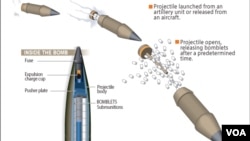Human Rights Watch has accused the government of Sudan of using banned cluster bombs on civilian areas in the southern part of the country.
In a report released Wednesday, the rights organization accused the Sudanese air force of using the banned munitions in "repeated, indiscriminate" bombing raids on civilian areas.
“The evidence that Sudan’s army has used cluster bombs in Southern Kordofan shows the government’s total disregard for its own people and civilian life,” said Daniel Bekele, Africa director at the global human rights organization.
"Sudan should immediately stop using these horrendous weapons, destroy its stockpiles, and respect the prohibition on cluster munitions," he said.
Human Rights Watch researchers visited Southern Kordofan at the beginning of April and found evidence that cluster bombs had been used in attacks on villages in Delami and Um Durein counties.
The researchers documented more than 15 bombings, some of them apparently purposefully directed onto civilian targets, which have killed or injured civilians and humanitarian workers since early 2014.
Cluster bombs contain multiple explosive submunitions, sometimes called "bomblets." After they are dropped from an aircraft or fired from the ground or sea, cluster bombs open up in mid-air and release their submunitions, which can spread out over a large area. The submunitions are designed to explode just above or on impact with the ground, but many do not and the bomblets lie dormant, posing a threat to anyone in the area.
The Convention on Cluster Munitions (CCM), which bans cluster bombs, entered into force in August 2010. To date, 116 states have joined the convention. Non-signatories include Sudan, South Sudan, the United States and Russia.




